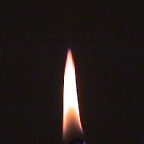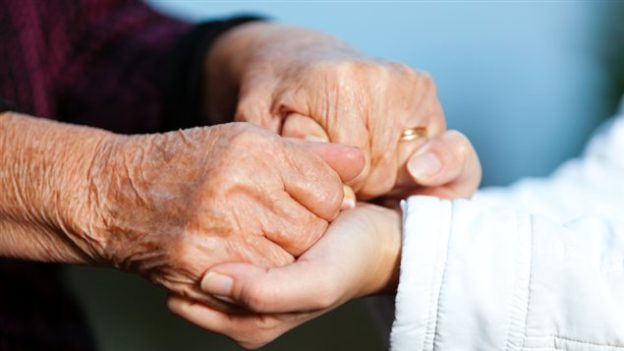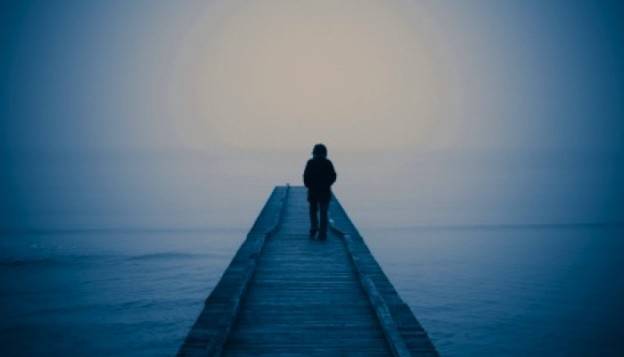Tag: bereavement
How do I tell Dad that Mom has died?
How do you tell Dad that Mom has died? This challenging question confronted old friends this past week.
Compassion is such a difficult practice. It is often so difficult to know what is the right thing to do for another person.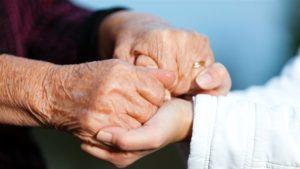
A friend’s mother recently passed away after a protracted decline. Sadly her dad is suffering from dementia. My friend and her siblings struggled with whether they should tell him that his wife, their mom, has just passed away. Would he find the loss overwhelming? Would he even comprehend the sad news they would share? He has a right to know and grieve the loss of his wife. But if the news was too much for him to handle, should they wait until there was a better time to inform him?
Further complicating things, he was physically unable to attend the funeral.
Both options, to tell him or not, are based on compassion for dad. But which one is right for him? She reached out to me for counsel.
My first suggestion was to consult dad’s doctor, someone who knows him and is skilled in these medical issues. The doctor can help ascertain how aware is dad of his surroundings. The children, all adults, can also shed some light on dad’s cognitive abilities, but they are emotionally very close to the situation and may not clearly assess how well dad will process the news. It is likely that despite all attempts to know, it is all but impossible to appreciate how much dad truly understands.
We cannot know how people will react to this kind of news even without the complications of these circumstances. Maybe dad will have only a moment of clarity or possibly the news will stay with him. He may work through his grief or become overwhelmed by it. I have learned along my journey that we actually only have moments together. Sometimes these moments last and create enduring memories. Sometimes they fade away. The best we can do is to be fully present in each moment together and hope that it endures. The struggle that this family confronts is a struggle we all face, for each of us will experience loss and then try to reconcile with it in the aftermath. We can try to anticipate how people will respond, but we need to be careful in presuming too much, acting for them instead of allowing them the dignity of exercising his or her own agency.
The Talmud teaches that we treat parents with honor and respect. Might the ways we do that include withholding speech or information that would be hurtful? If dad still has some comprehension, won’t he feel the sadness in those surrounding him and wonder why his wife no longer visits? Further, how will he react if he learns of his wife’s passing long after the fact without the chance to mourn her loss? Arguably we honor our parents when we include them in even the most difficult things, rather than attempting to protect them. Each of us will be called upon to grapple with a similar situation. We must take the utmost care to ensure that our motives are true and that we act in the best interests of our parents and not fulfilling our own needs disguised as compassion. My friend’s struggle was because she loved her father and wanted what was best for him.
Zichronah Livrachah may my friends’ mother be a blessing for the family. May her father be given the opportunity to know that too.
Tazria-A metaphor for helping through bereavement
Something bad happens a strange infirmity of the body called Tzaraat appears. Some say it is leprosy, others claim it to be the heartbreak of psoriasis. But it appears on clothing too. Either way, the priest confirms the affliction and the family is moved out of community. The priest tends to the affected individuals watching to confirm that the disease has passed so they can rejoin the population. Something else might be going on here however.
I was planning a Shiva Minyan teaching the other day and I saw the words of this parshah speaking to us about the grief-stricken family.
Something calamitous happens when a loved one dies. The loss shakes the family to their core and, as our tradition suggests in our rituals surrounding death, the shock and grief is overwhelming and incapacitating. The seven days of Shiva are marked by an abnegation of needs; the mourners sit on low stools, do not attend to basic items such as grooming, clothes are rent.
We in the community are tasked to keep a caring eye on the mourner. We check in with them regularly. We bring the Kehillah, or sacred community, to the mourner so they may engage in prayer even though they are unable to come to the synagogue. We bring them food to eat because they are unable to care for themselves. We offer love and support and succor. We watch over them until it is time for them to start the process of re-joining the community. We welcome them with caring embrace when they come back to the synagogue to say Kaddish. Like the priest helping the ailing, we are responsibility to the mourners through the period of Shiva through the time they can return. Shiva is like the exile of old from the community. It is imposed for reasons over which the person has no control but is rendered impure, or in this interpretation separated because of the trauma of loss.
Tazria shows us that although an ordeal separates the mourner from the community, the community has a responsibility to reach out and continue to support the grief-stricken, acknowledging the difficult place to which they are banished by loss, but caring for them providing protection and then a pathway back to home and life.
Another Shabbat tinged with Sadness
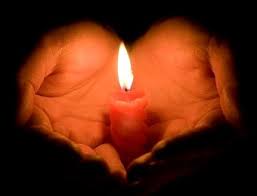 The mass shootings and murders at Umpqua College in Roseburg, Oregon has made this yet another difficult and tragic week in the United States.
The mass shootings and murders at Umpqua College in Roseburg, Oregon has made this yet another difficult and tragic week in the United States.
Again, another individual wrecked havoc on a community slaughtering unsuspecting innocents and destroying the lives of the families left behind. This murderer did this with weaponry that was too easily accessible.
We need to commit ourselves to keep guns out of the hands of people seeking to harm others as evidenced by a violent criminal history or by a struggle with mental illness. People who are inherently irresponsible cannot handle guns responsibly. It is reasonable to keep guns from them.
We cannot accept that mass murder and domestic terror are acceptable costs of living in the United States. Yet every time we allow no constructive action to reign in gun violence in this country we become part of the problem. These deaths are no longer just the responsibility of individual actors, be they angry or crazy. The blood is now on our hands. The responsibility is ours. As President Obama said in the wake of yesterday’s tragedy, “Our thoughts and prayers are not enough.” Indeed it is time to turn our revulsion into action. Write or Email your congressman as soon as you finish reading this and give the necessary support to overcome the politics of the gun lobby and demand an end to gun violence. Support responsible legislation that requires background checks of individuals for criminal and psychological issues; that requires documentation registration of all guns and all transfers of ownership, public and private; perform background checks on sale of ammunition; that requires training and licensing of gun owners. This cycle of horror will cease only when we demand a change.
Our condolences extend to the families that have been ripped apart by senseless violence. May we honor the memories of the slain through action to prevent this from happening again.
Shabbat Shalom.
The Power of Love and Forgiveness this Shabbat
Today the community lays to rest Reverend Clementa Pinckney along with the others murdered last week: Cynthia Hurd, Rev. Sharonda Coleman-Singleton, Tywanza Sanders, Ethel Lance, Susie Jackson, Depayne Middleton Doctor, Rev. Daniel Simmons, and Myra Thompson.
We have much to learn from the power of faith and the power of forgiveness of these extraordinary people and those who are left behind. The survivors of those who were slain by a human consumed with hate have shown the power of love and forgiveness. Jewish tradition views forgiveness differently. Personally, I struggle to think I could forgive as they have. We all have something profound to learn from these wonderful people imbued with a faith based in love.
We say zichronam livrachah, may their memories be for a blessing. The nine people assassinated during bible study in their church truly were a blessing to us. They and those they leave behind are an inspiration to all of us. We are all blessed. May that blessing be merited, may we build on what they have left to us.
Wishing you all Shabbat Shalom,
A prayer for peace in Baltimore
We all pray for the family of Freddie Gray. We mourn his tragic death and share the desire to see justice done for him.
We pray that peace return to the people and city of Baltimore. The frustration is understandable. But the violence and the destruction only serves itself. Nothing is gained by these acts, and in fact, these very acts undermine the pursuit of justice. We pray that cooler heads prevail and the desires of Mr. Gray’s family to respect his memory and stop the unrest immediately and calm is restored to the people of Baltimore.
Justice for Mr. Gray and his family must be the priority. The crisis of confidence that exists between the people of Baltimore and its police must be resolved and the larger societal issues must be acknowledged and remedied. Let us join together to make that happen.
Od Yavo Shalom Aleinu
Shiva at the Diner
One of the most difficult things we experience is the loss of a loved one. Death takes them away from us. We struggle with our new reality, whether the loss was sudden or even if it was expected, the moment of truth is not as expected.
Death is a complicated emotional process in which we experience loss, then grief and then we try to move forward. Jewish tradition gives us some wonderful coping mechanisms that acknowledge and honor the departed, our relationship to that person and a means of working through the loss.
When we attempt to circumvent or short-circuit the process we lose out. In our fast paced world, we want to “get it over with,” and move on. I frequently hear the need to return to work, which is more a desperate attempt to escape the discomfort of the current situation and not deal with it. Some of us suppress or even ignore our feelings attempting to deny the pain, leaving things unresolved. Our feelings will however come back to haunt us. A perfunctory approach does not serve us well. Our hearts just do not work that way. Judaism has a better way to deal.
Shiva, the traditional Jewish mourning period, is seven days (the word Shiva is Hebrew for seven). It is tempting to shorten this period to a three-day Shiva, or even a one-day observance. I did once hear of a family that decided they would sit Shiva Saturday night at the Italian restaurant/diner. These recastings of Shiva are reflections of everything but the acknowledgement of a profound loss and the grieving process that accompanies such a loss. Sadly, the people who survive are the ones who suffer as a result.
Our Jewish tradition wisely helps guide the survivors through the process. You quite literally sit with your grief, fully acknowledging this place and the loss. Your family, friends and the community gathers to support you in your time of aloneness to share that indeed you are not alone. You experience what we all will experience and we are both connected and strengthened by this knowledge. By being together we say you will get through this with our support and love. The community continues to show its support and love through the institution of the synagogue as a place where you can find not only solace but a caring community that can help you reintegrate as the immediacy of the pain begins to find a place in your heart rather than on your sleeve.
There is joy in life and pain in its loss. How we navigate these is what family, friends and community is all about. The traditional Hebrew phrase we share with someone who experiences a loss might be translated as: “May you find comfort in this place among family and friends.” This is among the values that makes embracing Judaism something sacred and profound.
G*d’s Burning Questions: A Tribute to Deah Barakat, Yusor Abu Salha, and Razan Abu Salha
The following is a re-post of Rabbi Michael Bernstein’s piece. Thoughtful and wise as always, Rabbi Bernstein’s words are worth contemplating.
Shabbat Shalom
|
On Tuesday, February 13th, Deah Barakat, Yusor Mohammed Abu Salha, and Razan Mohammed Abu Salha were shot to death by a man living next door to them at an apartment complex in Chapel Hill, North Carolina. Because they were observant Muslims and the man who murdered them had expressed what he called anti-theist views against believers of all faiths, there is an open question as to what motivated this murderer to pull the trigger and whether the killing was an act against the faith professed by these three students – whether they died because they were Muslims in America. For me, however, as I learn more about the incredible acts of devotion, kindness, and service to humanity performed by newly wed Deah and Yusor, and Yusor’s younger sister Razan, I am moved above all by how being Muslims in America shaped how they lived. Deah Barakat was a dental student who, among other projects, raised money for and led a mission to Turkey in order to provide urgent medical procedures and preventative oral care for Syrians whose lives had been ripped apart by war and turmoil. His work on behalf of those in need also informed his messages on behalf of seeking peace for all without exception. While the views of the world and its conflicts he expressed were in solidarity with Palestinians and other Muslims, he explicitly spoke out against violence done against Jews and against anyone who thought killing was the answer. He was a supporter of interfaith programming, including participation in sharing Ramadan with Beth Meyer Synagogue in Chapel Hill. What would be the last months of his life was a celebration of his love for his wife Yusor, a Muslim woman and fellow dental student. Yusor spoke powerfully about the blessing of being a Muslim in America on this StoryCorp recording and posted on social media about the practice of wearing the hijab, a full head covering, from the perspective of women’s empowerment. Her sister, Razan, was an award winning artist who, along with Deah’s brother Farris, was instrumental in helping to create an incredible video that affirmed the forward looking and hopeful mindset of Muslim students at North Carolina State University in a way that also showed the playfulness and individuality of a community often treated as monolithic by others. Deah, Yusor and Razan spent a significant part of their lives responding to a burning question read this week in the Book of Exodus (Mishpatim). This question arises in an unexpected place, an enumeration of laws of civil behavior that is explicitly concerned with not favoring any party in a dispute or legal proceeding. And yet in the midst of cases involving oxen being gored or goring others, and the laws of lending to those in need, the text breaks out of its legalistic tone and demands to know what would happen if a lender insisted on taking the only coat of a poor person as collateral and did not make sure to return it before the sun set. “This is his only cloak, in what will he sleep?” If a person has no cloak, no wealth, no protection either from nature or from malice, no one to care about his or her well-being —- “In what will they sleep?” And in many ways it was questions such as this that led Deah Barakat to dedicate his talents and his time to trying to alleviate suffering in Syria seeing what he could provide as a dentist as his version of the cloak. It is the revelation that G*d demands our attention for each person’s well-being that drives the kind of reflection on faith that inspired Yusor and Razan to articulate so powerfully how their beloved traditions must lead to understanding between different people and be a source of communal responsibility. For me, this bittersweet opportunity to learn more about these three remarkable people, “three winners,” as those dear to them have chosen to name them, has made me think of Matthew Eisenfeld and Sara Duker, may their memories be a blessing, dear friends murdered nineteen years ago by Hamas terrorists practicing a faith that is so unlike the understanding of Islam that these three students professed . Unlike the killers of Matt and Sara, it is not clear that the man who murdered Deah, Yusor, and Razan hated everyone like them. However, like Matt and Sara it is clear that the murderer’s cruel, unfathomable act of violence took from the world people whose incredible faith, talents and commitments to do good would have brought so much more compassionate insight into a world so in need of love. I imagine them having much to learn from each other should they meet beyond this world. A beautiful commentary called the Kli Yakar (“Precious Vessel”) reads the question “In what will he sleep?” also as a reference to the tradition that when a person dies their soul is cloaked in the good deeds they have done on behalf of others. If a person refrains from helping someone in this world, “In what will that person sleep” in the next world? Deah Barakat, Yusor Mohammed Abu Salha, and Razan Mohammed Abu Salha are, I believe, among those clothed now in the deeds of the righteous. Yet we are poorer for not having the new answers that they would have provided to G*d’s burning questions. May G*d, to whom we call by many names, provide for these witnesses an abode in Paradise, may their memories be a blessing to all they touched and the entire world. Shabbat Shalom, Rabbi Michael |
Dan Markel’s Meaningful Life Ends in Senseless Death
Dan Markel’s Meaningful Life Ends in Senseless Death.
Words from Jay Michaelson in The Forward on his friend’s death.
Where do we go from here?
In the aftermath of four dead children, we need to carefully assess who we are, not who we believe ourselves to be. It is hard to be self-critical, but it is critically important. The tragedies of the four slain boys is deeply shocking and painful. What it can tell us about ourselves is a step toward understanding those we currently consider adversaries on so many levels and how we might find a way to live together. The horrible reality is that we have been sacrificing our children for way too long. Our tradition compels us to continue to seek another way. It will be hard and fraught with obstacles and disappointments.
Israel is a nation of laws. Once, the aspiration was that Israel would be a nation like all other nations. But in fact, we hold Israel to a higher standard of ethics and morality. Although inevitably she will fall short of our ideal, it is the aspiration that makes her the land of hope for all Jews. We support and love her and commit ourselves to striving to reach the ideal where all children might live in peace and security. We have much work to do. Let everyone use the tragedy that has befallen all of us to dedicate ourselves to the possibility of achieving peace someday

